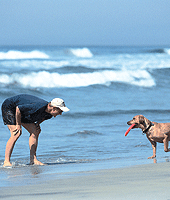Advertisement
Acupuncture for Pets
Pets are an important part of our families, and it’s heart-wrenching to see any member of the family in pain. Yet many people, when faced with the illness or injury of a pet, find themselves in a quandary no one wants an animal to suffer, but many orthodox treatment options are expensive, invasive, and not … Continued
 Pets are an important part of our families, and it’s heart-wrenching to see any member of the family in pain. Yet many people, when faced with the illness or injury of a pet, find themselves in a quandary no one wants an animal to suffer, but many orthodox treatment options are expensive, invasive, and not guaranteed to work. Enter the healing art of acupuncture. This ancient practice offers the benefits of being safe, natural and non-invasive, with virtually no side-effects.
Pets are an important part of our families, and it’s heart-wrenching to see any member of the family in pain. Yet many people, when faced with the illness or injury of a pet, find themselves in a quandary no one wants an animal to suffer, but many orthodox treatment options are expensive, invasive, and not guaranteed to work. Enter the healing art of acupuncture. This ancient practice offers the benefits of being safe, natural and non-invasive, with virtually no side-effects.
Acupuncture stems from the Chinese philosophy of Dao. Daoists believe that every living thing is comprised of Chi (Qi), the overall life force; Shen, responsible for consciousness and mental ability; and Jing, responsible for growth and development. Good health is only attained when these components are properly balanced. By inserting needles into specific points around the body, acupuncturists can help regulate the flow of Qi, prevent loss of Jing, and bring all three forces into harmony.
Acupuncture can be applied to all animals, small and large. It can also work for many different types of illness and injury. However, veterinarians use it mostly to relieve chronic pain, arthritis being the most commonly treated condition. Dr. Susan Wales, a certified veterinary acupuncturist in Lake Country, BC, says the bulk of her acupuncture clients seek treatment for arthritis, as well as problems with the back and spine, and even partial paralysis. “As long as there’s some nerve function, acupuncture works best” she says. Acupuncture can also help certain acute conditions, including respiratory, gastrointestinal and cardiac problems, and trauma. Some vets use acupuncture to regulate breathing and heart rate when administering a general anaesthetic for orthodox operations.
Most of Dr. Wales’ clients receive six to eight treatments over a period of several weeks. After an initial consultation, each visit lasts between 10 and 20 minutes, depending on the condition being treated. Effects of acupuncture are cumulative for some patients, overall well-being returns quickly, after which the condition being targeted will improve.
Generally, pets behave well during acupuncture treatments. Cats in particular are surprisingly easy to treat when cats are scared or threatened, they tend to stay frozen in one position, making it easy to insert needles. Dogs, being more excitable, can be troublesome. For very difficult patients, Dr. Wales will perform an alternate procedure under a general anaesthetic, tiny gold beads are permanently inserted under the skin at the proper acupuncture points. Later on, she can stimulate the beads without the hassle of inserting needles.
Choosing a Pet Acupuncturist
Here are some things to keep in mind when seeking treatment for your pet:
- All veterinary acupuncturists must be licensed veterinarians.
- All veterinary acupuncturists must have formal acupuncture training, and should be certified by a recognized society or institution. IVAS (the International Veterinary Acupuncture Society) is the largest and most widely-recognized group.
- Acupuncture is considered a surgical procedure that only qualified professionals may perform.
For more information, contact IVAS:
PO Box 271395
Ft. Collins, CO 80527-1395
Phone: 970-266-0666
Website: www.ivas.org
E-mail: office@ivas.org




